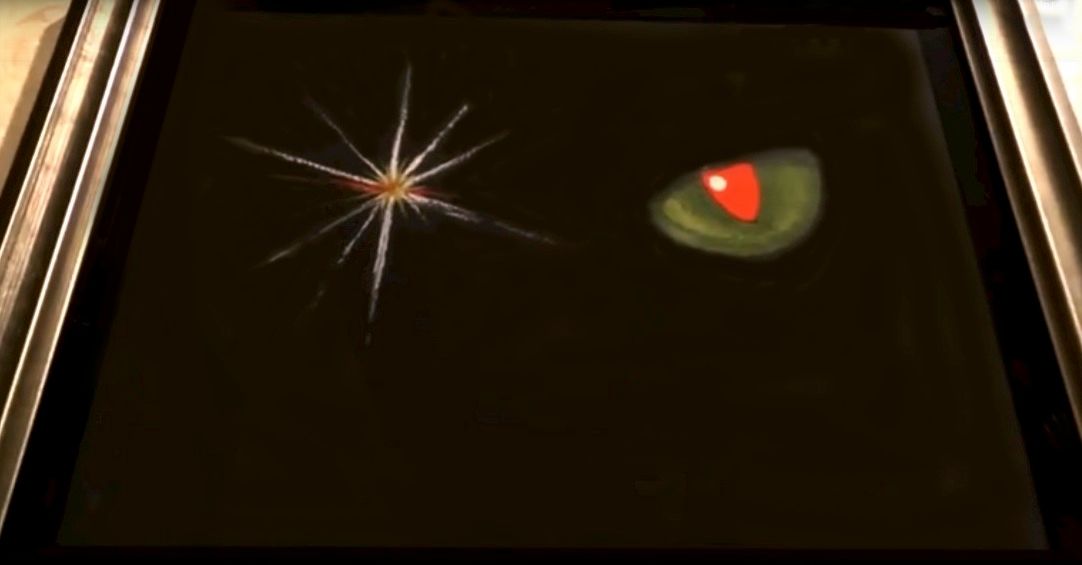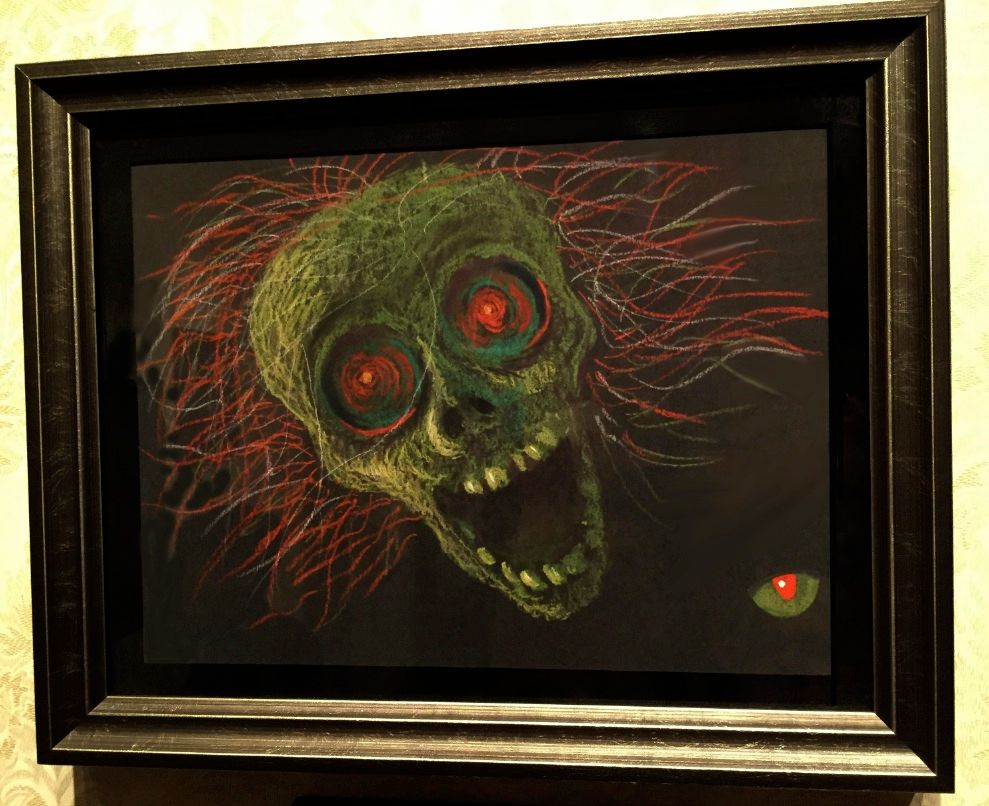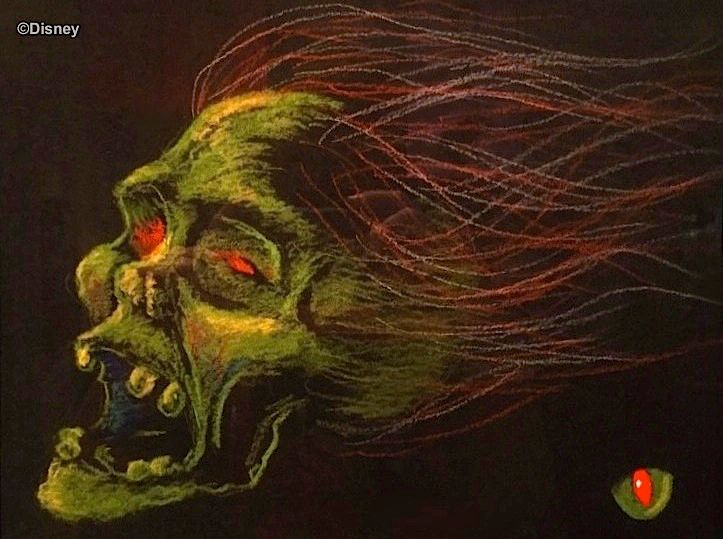The unseen Ghost Host acts as a sort of ambassador, a go-between, someone equally able to speak to us in the mortal realm as well as to his fellow spirits (presumably). Other than a few directives from the Cast Member Butlers and Maids, telling us to get to the center of the stretching gallery, the GH is our only narrator and guide. He never really tells us what his motivation is in taking us on this little tour. Right up until the end of the ride, you don't know if he's good or evil.
We're so used to this arrangement by now that we forget that doing it this way was a choice. As it turns out, it was a choice made only a few months before the Haunted Mansion opened. Some of the rejected alternatives would have made for a very different ride experience if they had been implemented. One of these is fairly well known and has left traces behind in the ride. There is another one, far less well-known, which has left nothing behind. One thing they have in common is that both of them add an additional character who interacts with both the Ghost Host and with you, the rider.
Very different chemistry. This was not a trivial decision, as we'll see.
The Raven
Died in the wool Mansionites know a lot about this character, so if you're one of those, and you're impatient, you might scroll down to the Cat section, which includes stuff you've never seen, I promise.
Riders can hardly help noticing that there is a raven which accompanies them throughout the ride, starting with the Conservatory scene and ending at the entrance to the crypt at the end of the graveyard scene. There are five all together, but they are all supposed to be the same character. All it does is caw at us. Especially at DL, particular attention is drawn to it as we descend into the graveyard. Despite having our focus obviously directed at it at that point, we're gettin' bird noises and that's it.
Originally, the WDW raven sat on the branch right above you too, as you tilted back, but due to "guest abuse" it was moved back and put on a branch well off to the side. Ketchup packets, I imagine.
Caw-caw. At least the bird sounds real. According to Stacia Martin (The Sounds of Disneyland [Disney, 2005] 31), he was voiced by "Candy" Candido, best known as the go-to guy for basso profundo in cases where even Thurl Ravenscroft couldn't get low enough. (Candy must have had freakin' bridge cables for vocal cords.) What is less well-known is that Candy was extraordinarily versatile and could do very high voices as well. The same source says that Candy did the raven in Sleeping Beauty and simply hauled out his raven cry again ten years later for the Mansion.
Be that as it may, originally there were going to be several more ravens, including one in the stretching room, one in the foyer, and one at the up ramp at the end. (You can read about the foyer one HERE). This was still going to be the case going into the spring of 1969. The raven was going to talk to you, along with the unseen Ghost Host. The 1968 show script which provided the basis for the "Story and Song from the Haunted Mansion" album preserves a lot of the raven's dialogue. The bird criticizes the stretchroom advice given by the GH ("He chose the coward's way! Caw-caw"). I guess the GH is a little miffed, because shortly afterwards he responds by warning you that the raven is a possessed creature, and its "restless spirit" may be looking for an opportunity to "better itself." This bickering leaves you wondering which (if either) of these voices from regions beyond should be trusted. But the raven is also the one who warns you about the ghostly hitchhikers at the end, so by that point you have probably come to trust the little guy. He even calls you "my friends," so you see? He cares. I guess there was no caws for concern. (Oh shut up; it's my blog.)
In 2009 an interesting subplot involving the raven came to light. As told by Jeff Baham:
"This raven, or 'jabbering jay' as it was called in the script, was intended to create a mystery to be solved as guests rode through the attraction. As the raven, adorned with a mysterious medallion around its neck, spouted bits of Poe and nonsensical whimsy throughout the attraction, the Ghost Host would make clear that the bird was looking for a mortal body to inhabit. At the end of the attraction, one of the hitchhiking ghosts glimpsed in the mirror that is supposed to follow you home would be seen to be wearing the same medallion, as the Ghost Host revealed that HE was actually the raven's wretched soul, and he was following you home to better himself."
(Baham, The Unauthorized Story of Walt Disney's Haunted Mansion [Theme Park Press; 2016] 63-64.)
The eerie raven first appears in a Ken Anderson (Duane Alt) concept sketch. Marc Davis liked it and kept it, and it seems that there was never a time when it wasn't going to be part of the show.
Is the talking raven taken from the famous Edgar Allan Poe poem? If we're speaking of an indirect influence, the answer is an easy yes. Poe is indeed responsible for adding the raven to the short list of recognized Halloween critters (bats, spiders, black cats, owls). But even in a direct sense, the answer is yes. In an early script, the raven warns us about itself (huh?) and the hitchhikers, with "nevermore's" and "evermore's" sprinkled everywhere. The lines were recorded at one point by the incomparable Eleanor Audley (Lady Tremaine, Maleficent, Madame Leota). Warning! If you're an admirer of Ms. Audley's work (yes, yes, I see those hands), this excerpt is painful to listen to. But we historians cannot afford the luxury of pity.
Beware of Eleanor's Raven, Forevermore
Oh geesh, that was bad. Anyway, it proves that X. Atencio was directly influenced by "The Raven" when he tried to script the character. One problem with the raven—besides being annoying—was that it was too small to command your attention in some of the larger scenes. Maybe a bigger animal would work. Let's see...no, you can't have an elephant in a haunted house. How about a black cat? More specifically, how about an Edgar Allan Poe-inspired black cat?
The One-Eyed Black Cat
"The Black Cat" is one of Poe's better known tales, often anthologized, and read in many a high school English class. If you've forgotten how it goes, here's a severely abbreviated summary:
The narrator had a beloved black cat for a pet, but one day in a fit of alcoholic rage he gouges out its eye with a knife. Later on, guilt at the sight of the one-eyed black cat turns to resentment and he kills the animal. Later he finds (or is found by) another one-eyed black cat and takes it as a pet. In yet another one of his fits of rage he murders his wife and walls her up in the cellar. When the police investigate, however, the narrator is betrayed by the howling of the cat inside the wall, where it had been walled up with the corpse.
A much creepier Poe animal than the raven, certainly. Most Mansion fans know about the existence of the one-eyed black cat only from a couple of Paul Frees outtakes, in which he tries out his note-perfect Bela Legosi and Peter Lorre voices while using a revised HM script. Dude, when Count Dracula sees fit to warn you about a kitty, it must be one bad motorscooter.
Ghost Host Bela warns you about a nasty cat
Ghost Host Peter warns you about it too
As you can gather from those, X's cat was much scarier and more demonic than his raven. None of the cat's dialogue has survived, but X did a series of concept sketches. The notion that the cat would be co-narrator may even predate the notion of putting the earlier raven character into that specific role. It looks as if the black cat might manifest itself at first as nothing more than an eye:
Apparently, the eye would morph into a shiny point of laser-like light...
...and a cat face would appear with only one eye.
The first eye you saw turns out to be the missing eye of a black cat.
The next time you see it, the cat's face has changed for the worse.
From the looks of it, this loud and angry feline is looking for more than just a Little Friskies num-num.
The morphing continues, and the face rots into a more human form.
Not surprisingly, this does nothing to improve its mood.
Not surprisingly, this does nothing to improve its mood.
Good Lord. And how was this thing going to be presented? A projection? That isn't clear. It's possible that the "cat" was going to just pop out unexpectedly along the way in its various stages of demonic materialization. The face above looks a lot like a blast-up head in another X concept sketch. A quick look at some actual blast-up heads (inset) confirms that this is what the artwork is about.
The fact that another sketch of the "screaming skull" is based on an actual mummified-skull prop supports the idea that X envisioned something like a blast-up skull flying around.
So yeah, maybe the "cat" was going to jump out and surprise us throughout the ride. Good Lord.
So yeah, maybe the "cat" was going to jump out and surprise us throughout the ride. Good Lord.
When neither the demonic one-eyed black cat nor the "nevermore"-squawking raven ended up being used, the HM lost its only clear Edgar Allan Poe allusions (although you could make a case for a Tell-Tale Heart allusion in the bride's beating heart). It would have been nice if someone had told the composer of this WDW pre-opening publicity poster that the Haunted Mansion could no longer be accurately described as "Edgar Allan Poe-styled."
The black cat was a short-lived idea, with good reason. By having the Ghost Host warn you about a clearly malicious and dangerous creature like this one, he cast himself into the role of protector. He was there to help you. Similarly, in the 1968 script, the GH graciously informs you at the outset that you will not be harmed. That's very decent of him.
Too decent. Who wants Santa Claus for a Ghost Host? A haunted house is an allegory of life itself. You enter here and you exit there, and in between is a dark twisted corridor filled with frightening sights. You may get advice along the way, but you never have quite enough evidence to be sure that those voices have your best interest at heart. Do you really want to go into that haunted house that the neighbor kid put up in his garage for Halloween—the one who's a minor league juvenile delinquent the rest of the year?
Enter if you dare.
The Haunted Mansion is no different than any thirteen-year-old's spook house, and it's no different from life. Once you're in, you don't know if the Host is benign or malicious, so you have no choice but to go ahead, even with insufficient data. When you're stuck in a haunted house, the secret is to not panic and to keep your wits about you and to just keep going. If you do that, you're likely to make it.
Kinda like life.
So the trouble with the villainous black cat is that it made the Ghost Host much too unambiguously a good guy. It's important that he make you a little nervous, a little unsure.
What was the trouble with the raven, then, aside from being a tad too small? With the cat, we had a bad guy co-narrator and a good guy main narrator. With the talking raven, we had a morally ambiguous co-narrator along with a morally ambiguous Ghost Host. At first, you don't really know if either of them can be trusted. But in that case, why do you need two narrators? The real problem with the raven was that it was redundant. Turn off its dialogue and give its few substantive comments to the GH, and ta da, nothing is changed. Just make sure the GH never really tells you what he's up to.
.









another fantastic post! one minor correction - the raven at WDW is on a tree branch to the right, not a railing
ReplyDeleteOops, thanks. I shall correct it immediately.
ReplyDeleteGreat post! One question though, in the rotted human form of the cat, why is there a (his?) glowing eye at the bottom right hand?
ReplyDeleteJust two pieces of concept art on the same page, I think.
ReplyDeleteHi Dan - interesting post - as always! I did an interview with X Atencio back in the late 90s - and I do recall asking him about that one-eyed black cat. I know I digitized that interview - let me see if I have it archived on my external hard drive here & I will send it your way.
ReplyDeleteBest,
Chris M
That would be fantastic.
ReplyDeleteAfter listening to the "X files," I suppose that a word should be said about sheer logistics. X. claimed that using the Raven as narrator (or co-narrator, I suppose) just wouldn't "time out" properly, wouldn't have coordinated with the GH narration feeding into the doombuggies. But this problem had already been solved in the script you hear on the "Story and Song" album. The Raven could still have squawked a few short lines over and over, like "You've disturbed a guest! You'll be sorry for that!" in the Conservatory, or "Beware of hitchhikers!" at the crypt entrance. If the GH kept silent while passing through those zones, there would be no problem.
ReplyDeleteIt's fascinating to learn that the One-Eyed Cat artwork dates to 1967. That leaves open the possibility that it was conceived while the ride was still a walk-thru. They all knew a walk-thru was inadequate, but it seems to have remained the default format until a workable ride system was found, which did not take place until the second half of 1967.
That one eyed black cat really creeps me out, knowing the backstory and seeing the concept art, perhaps it was also canceled out because having such a clearly hostile presence in the Haunted Mansion was just too scary?
ReplyDeleteThat cat is sooo freaky! I can see why they didn't use it.
ReplyDeleteThere are still some Poe references in the mansion- the "man trapped alive" could be a reference to The Cask of Amontillado.
ReplyDeleteEleanor's Raven made me laugh. I loved how in every sentence, her voice started out screechy then decayed (pardon my pun) into her normal voice.
ReplyDeleteIn response to that comment I wrote anonymously earlier about the Poe reference, I meant the one in the Conservatory. After reading some of your earlier posts, I now realize he wasn't trapped alive, but it still reminds me of that story.
After reading another blog post, I now realize I was referring to the brick arm guy, and that you already touched base on this gag. My bad!
ReplyDeleteA wee bit of video fun with Candy Candido... http://youtu.be/-5fuuGSguk4
ReplyDeleteHello,
ReplyDeleteDo you know who voiced the Raven in The Story and Song? I don't think it's Eleanor Audley there…
Ginny Tyler
Delete